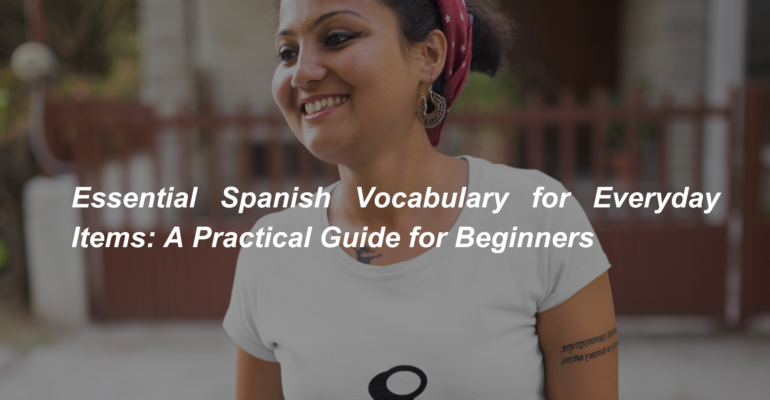Essential Spanish Vocabulary for Everyday Items: A Practical Guide for Beginners
Essential Spanish Vocabulary for Everyday Items: A Practical Guide for Beginners
Estimated reading time: 6 minutes
Introduction:
Learning a new language starts with the basics, and one of the most important aspects of Spanish is knowing the vocabulary for everyday items. Whether you’re at home, in the office, or out shopping, understanding these common terms will help you communicate better in a variety of situations. In this blog, we’ll focus on the basic vocabulary for everyday items in Spanish and explore how to use these words in different contexts. For Hindi and English speakers, this guide will highlight useful comparisons between the three languages to make the learning process smoother.
By the end of this post, you will have a solid understanding of essential Spanish vocabulary, and you’ll be able to easily identify common household and daily objects in conversation.

Understanding Basic Vocabulary for Everyday Items in Spanish
In Spanish, like in Hindi and English, nouns play a critical role in describing objects around us. Common household items, office supplies, and personal belongings are all part of this everyday vocabulary. Here are some fundamental words that will help you navigate daily conversations in Spanish.
Common Everyday Items in Spanish:
- La mesa – The table
- Hindi: मेज़ (mez)
- English: Table
- El vaso – The glass
- Hindi: गिलास (gilas)
- English: Glass
- La puerta – The door
- Hindi: दरवाज़ा (darwaza)
- English: Door
- La ventana – The window
- Hindi: खिड़की (khidki)
- English: Window
- El teléfono – The phone
- Hindi: फ़ोन (phone)
- English: Phone
- La silla – The chair
- Hindi: कुर्सी (kursi)
- English: Chair
- El libro – The book
- Hindi: किताब (kitaab)
- English: Book
- El bolígrafo – The pen
- Hindi: पेन (pen)
- English: Pen
- El coche – The car
- Hindi: गाड़ी (gadi)
- English: Car
- La cama – The bed
- Hindi: बिस्तर (bistar)
- English: Bed
Grammar Breakdown: Using Everyday Items in Sentences
In Spanish, all nouns, including those for everyday items, have gender (either masculine or feminine) and are either singular or plural. This is similar to Hindi, where objects are also categorized by gender, though English lacks this feature. Let’s explore how these words are structured in Spanish and compare them to Hindi and English.
- Gender of Nouns:
In Spanish, nouns are either masculine or feminine, which affects how we use articles like “el” (the) for masculine nouns and “la” (the) for feminine nouns. Similarly, Hindi nouns also have gender, with “लड़का” (boy) being masculine and “लड़की” (girl) being feminine. In English, however, nouns do not have grammatical gender.- Examples:
- El libro (The book) – किताब (Masculine)
- La silla (The chair) – कुर्सी (Feminine)
- Examples:
- Singular and Plural Forms:
Just like in Hindi and English, nouns in Spanish can be singular or plural. To make a noun plural, you generally add -s or -es in Spanish. In Hindi, the plural of a noun often involves more complex changes depending on the noun’s ending, while in English, most nouns follow a regular -s pattern.- Examples:
- Singular: El vaso (The glass) – गिलास – Glass
- Plural: Los vasos (The glasses) – गिलास – Glasses
- Examples:
- Articles in Spanish:
Articles (like the, a) are essential in both English and Hindi, but in Spanish, they also change depending on the noun’s gender and number. Hindi uses a similar system of gender-specific articles, while English uses gender-neutral ones.- Examples:
- El teléfono (The phone) – फ़ोन (Masculine)
- La puerta (The door) – दरवाज़ा (Feminine)
- Examples:
-
Product on sale
 French DELF B1
French DELF B1₹32,600.00
₹42,600.00
List of Exceptions in Using Everyday Vocabulary:
- Nouns Ending in “a” That Are Masculine:
Typically, nouns ending in “a” are feminine, but there are exceptions, such as el mapa (the map) and el día (the day). These are exceptions to the usual gender rules. - Plural Forms of Nouns Ending in a Consonant:
Nouns that end in a consonant often require an -es ending to make them plural. For example, el bolígrafo (the pen) becomes los bolígrafos (the pens). - Gender-Neutral Words for Objects:
Some words, especially for new technologies, don’t follow traditional gender rules. For example, el internet (the internet) is masculine, despite not fitting into typical patterns of gendered nouns.
Example Sentences:
- Tengo un libro.
- English: I have a book.
- Hindi: मेरे पास एक किताब है।
- La mesa está limpia.
- English: The table is clean.
- Hindi: मेज़ साफ़ है।
- Abre la puerta, por favor.
- English: Open the door, please.
- Hindi: दरवाज़ा खोलो, कृपया।
- El coche está en el garaje.
- English: The car is in the garage.
- Hindi: गाड़ी गैराज में है।
- Necesito un bolígrafo para escribir.
- English: I need a pen to write.
- Hindi: मुझे लिखने के लिए एक पेन चाहिए।
- Las ventanas están cerradas.
- English: The windows are closed.
- Hindi: खिड़कियाँ बंद हैं।
Frequently Asked Questions (FAQs):
Conclusion:
Building a strong foundation in basic vocabulary for everyday items is crucial for effective communication in Spanish. By understanding how to use nouns, their gender, and their plural forms, you’ll be able to talk about everyday objects effortlessly. Just like in Hindi and English, learning these fundamental words will make your conversations smoother and more practical. Remember to practice regularly, and soon enough, these words will become second nature to you. Happy learning!
Enhance Your Spanish Skills!
To improve your Spanish further, consider enrolling in our Spanish Course at Learn Languages Store for just Rs. 16,300. Our courses are designed to help you build a strong foundation in the Spanish language in a fun and engaging way.
Contact Us to Learn More!
For more information about our courses, feel free to reach out to us at:
Address:
330, 3rd Floor, Big Splash (Near Vashi Bus Depot),
Sector 17, Vashi,
Navi Mumbai, Maharashtra 400703
Phone: +91-9594113111
Email: services@learnlanguages.store
Don’t miss the opportunity to enhance your language skills! Sign up today and start your journey to fluency in Spanish!










